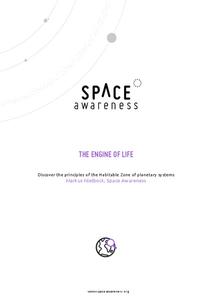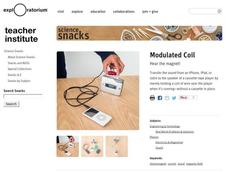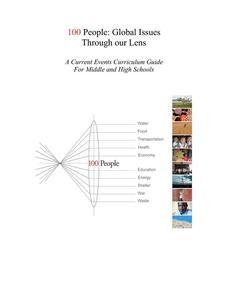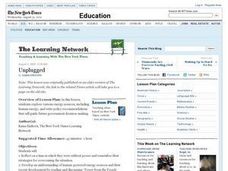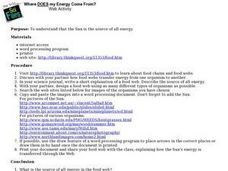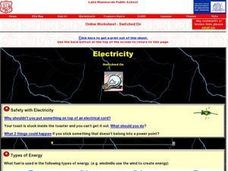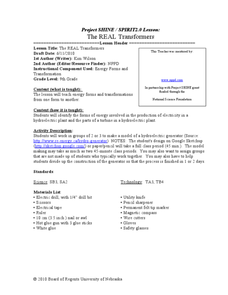Teach Engineering
Light vs. Heat Bulbs
Careful, that light bulb is hot! Compare heat and light energy using a simple light bulb. The exercise addresses energy conservation and presents actual calculations to determine the most cost-effective light bulb.
Colorado State University
What's the Difference Between Blue Light and Red Light?
Finally, an electromagnetic spectrum lab that will get glowing reviews from your class! Explore the nature of light using red and blue LED sources and fantastic phosphorescent paper. Young scientists compare the effects of blue light...
Space Awareness
The Engine of Life
There is a specific zone, or distance from a star, that a planet must be in order to have water in a liquid form. The activity demonstrates how flux density depends on its distance from the source. A photovoltaic cell gets power to...
Exploratorium
Modulated Coil
Transmit sound with an electromagnet. Class members follow the provided direction and build an electromagnet that will transmit sound though a cassette-tape player. As as extension they create an air core electromagnet and...
Curated OER
Make a Windmill
Learners explore Earth science by conducting an energy experiment in class. In this windmill lesson plan, students identify how wind has been used to pump water throughout history and the latest developments wind energy has produced....
Curated OER
Class Presentation on Coal
Did you know that coal was formed from plants? After being assigned a coal-related topic, groups gather, organize, and present information about this energy source. The presentations should include visuals like graphs, charts, tables,...
Curated OER
Thinking about Energy
Students navigate through a web-based survey to help engage curiosity about energy concepts. They describe how prior perceptions influence examineing of energy concepts. They evaluate comprehension about concepts of energy.
100 People Foundation
100 People: Global Issues Through Our Lens
If the world were 100 people...17 would not have access to safe drinking water, 18 would not be able to read or write, and 52 would not have a primary education. Using the theme of "100 people," this resource explores other major issues...
Curated OER
Unplugged
Students read the article "Power From the People Breaks the Hold of Batteries and Plugs." Students work in groups to examine various sources of power. Students debate the advantages and disadvantages of each power source. They assume the...
Curated OER
Where Does My Energy Come From?
Students gain an understanding that the Sun is the source of all energy. With a partner, they examine various web sites to explore food chains and food webs, later sharing their findings with the class.
Curated OER
Wind Power
Fourth graders develop an understanding of how engineers use wind to generate electricity. They will build a model anemometer to better understand and measure wind speed. They discover that engineers design wind turbines that generate...
Practical Action
The Wind Power Challenge
Up it goes! Groups must design and build a windmill able to lift a weight. The packet includes discussion points to use prior to the build that cover topics such as variables, fairness, and the design process.
Science Matters
Wave Watching
Seismologists use the direction and arrival times of p waves and s waves to determine the distance to the source of an earthquake. The engaging activity has students line up to form human waves. Through different movements when attached,...
PBS
Cloud Clues
It's cloudy with a good chance of learning! An inquiry-based lesson begins with an exploration of transparent, translucent, and opaque materials. Young scientists then connect their learning to the different cloud types as they take the...
Discovery Education
The Time of Our Life
Mammals are some of the newest organisms to appear on Earth. Young scholars complete an activity that results in a timeline showing the appearance of different types of living organisms. Provided with a list that spans from prokaryotes...
PBS
Kinetic Sculpture
Build a sculpture that moves on its own; no power source required! The second installment of a five-part series has individuals create a sculpture that moves with the wind. It can't topple over though, so some type of support is necessary.
Curated OER
Electricity
Focusing on what electricity is and where it comes from, the information here is accessible to young scientists. The basics of how electricity is made and its uses as a power supply are given with clear illustrations. Some examples...
Curated OER
Making Waves with the Electromagnetic Spectrum
Pupils explore various types of electromagnetic waves, the range of the spectrum, and common sources of electromagnetic waves.
Curated OER
Biomass As a Fuel
Students investigate the use of biomass as a fuel. They discuss energy and its uses in their homes. They explore the two types of energy, potential and kinetic and examples of both types. They study the process of photosynthesis and...
Curated OER
Online Worksheet- Switched On- Electricity
In this online electricity worksheet, students use the links to find answers to questions about solar, hydro, nuclear, fossil fuel, and geothermal energy sources. They conduct two experiments that are based at online sources.
Curated OER
Walk a Mile for a Burger?
Students are introduced to the pedometer, and use this tool to associate physical activity (physical energy) with calories burned (chemical energy). They comprehend the making and burning of energy.
Curated OER
The REAL Transformers
Ninth graders create a model of a hydroelectric generator. In this physics lesson, 9th graders discuss how energy can be transformed from one form to another. They make a flow chart for different energy generating plants.
Teach Engineering
Solar Angles and Tracking Systems
The sun will continue to rise in the east and set in the west, no matter what. The first lesson in a series of eight introduces the class to solar angles. It makes connections between a person's latitude and the angle of position of the...
Carnegie Mellon University
Consumer Preferences in Lighting
What is a watt? This tongue-twisting, mind-bending question and others are answered through this lesson plan on the different lighting options available. With the support of a PowerPoint, teach your physical science class about units of...




